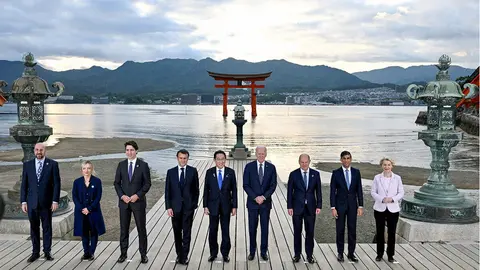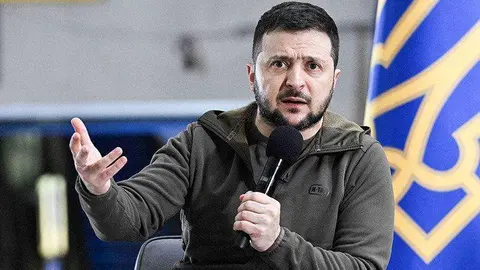Gaza, Ukraine and the Indo-Pacific key issues in G7 Foreign Ministers' statement in Tokyo

The request for a humanitarian pause in Gaza, the commitment to support Ukraine and concern over the growing instability in the Indo-Pacific were the key points agreed by the G7 foreign ministers during their meeting in Tokyo, which concluded today.
In their joint statement, the Foreign Ministers of the bloc comprising Canada, France, Germany, Italy, Japan, the United Kingdom and the United States say they are "more united than ever in the pursuit of international peace, security and prosperity" and remain "steadfast in defending and strengthening the international order".
The declaration places particular emphasis on territorial conflicts and puts a special focus on the three mentioned.
Humanitarian pause in Gaza
The adoption of a unanimous message on the Israeli-Palestinian conflict seemed complex, given the different approaches taken by the members of the bloc when referring to issues such as the Israeli right to defend itself or the increase in civilian deaths in Gaza.
"We support humanitarian pauses and corridors to facilitate urgently needed assistance, the movement of civilians and the release of hostages," the ministers said in the text, in which they avoided expressly mentioning the request for a ceasefire, as some voices on the international scene have done.
In their first joint statement of this kind, the G7 Foreign Ministers condemn "the escalation of violence by extremist settlers towards Palestinians" as "unacceptable" and a threat to the prospects for a lasting peace, which they believe "can only be achieved through a two-state solution".
The statement also sends a message to Iran, urging it to "refrain from offering support to Hamas and from further destabilising acts" in the region, and to "use its influence" to "reduce regional tensions".
Continued support for Ukraine
With regard to the Russian-Ukrainian war, which was the main topic of the meeting before the deterioration of the situation in the Middle East, the G7 foreign ministers reiterated that they would continue to support Kiev as necessary and impose "strict" sanctions against Moscow for its invasion of its neighbour.
They pledged to keep Russian sovereign assets frozen under their respective jurisdictions and to accelerate their coordination to impose additional measures on Moscow's sources of revenue, such as its energy, metallurgical and gemstone and diamond businesses.
They also called again on third countries that are providing support to Moscow to cease their support and threatened retaliation.
Stability in the Indo-Pacific
The G7 Foreign Ministers also addressed the growing instability in the Indo-Pacific region, where they are watching with particular attention North Korea's arms developments and China's military build-up and territorial aspirations.
The bloc "strongly" condemned Pyongyang's transfers of arms and ammunition to Moscow, which were allegedly used in the invasion of Ukraine, and called on the North Korean regime to "immediately cease all such activities", as well as urging it to "complete, verifiable and irreversible" nuclear disarmament.
The statement devotes a separate section to China, with which it says it wants to "build constructive and stable relations", but reduce its excessive trade dependence on Beijing, which it accuses of inappropriate practices.
The group also calls on the Asian country "not to assist Russia in its war against Ukraine" and to pressure it to end aggression, and asks it to contain its territorial aspirations over the self-ruled island of Taiwan, arguing that stability in the strait is "indispensable" to stability.
In connection with their aspiration to reduce their trade dependence on China, the G7 members expressly mention in their latest statement their desire to further strengthen their relations with other territories, especially those in Africa, where Beijing has been expanding its influence in recent years.










